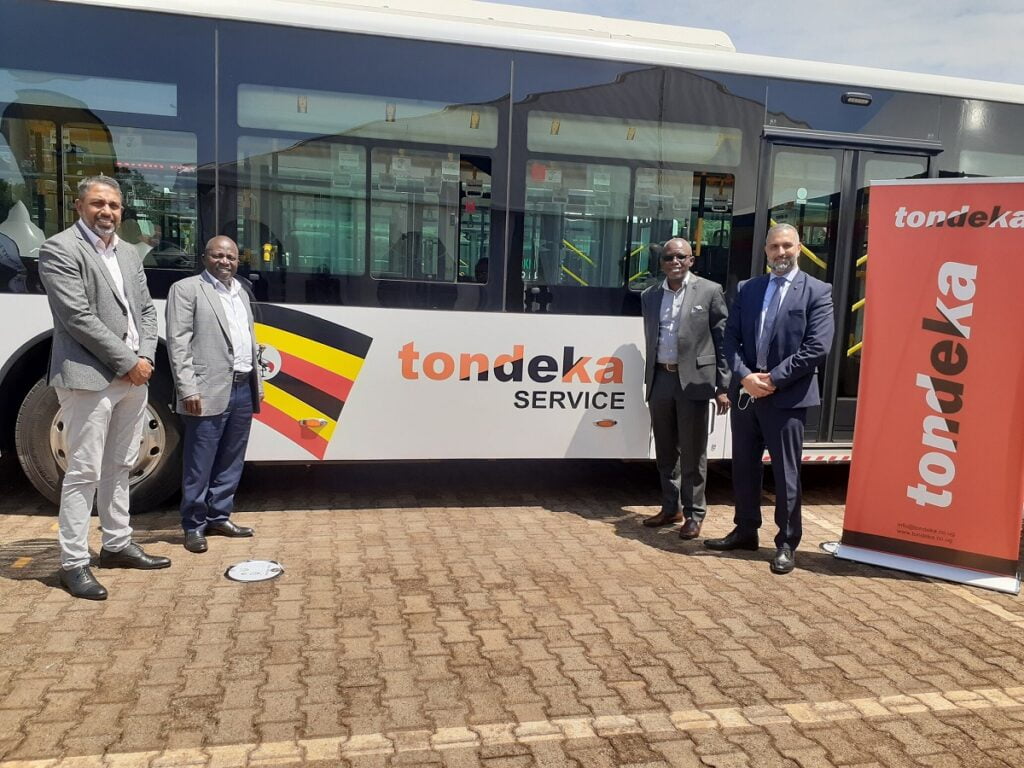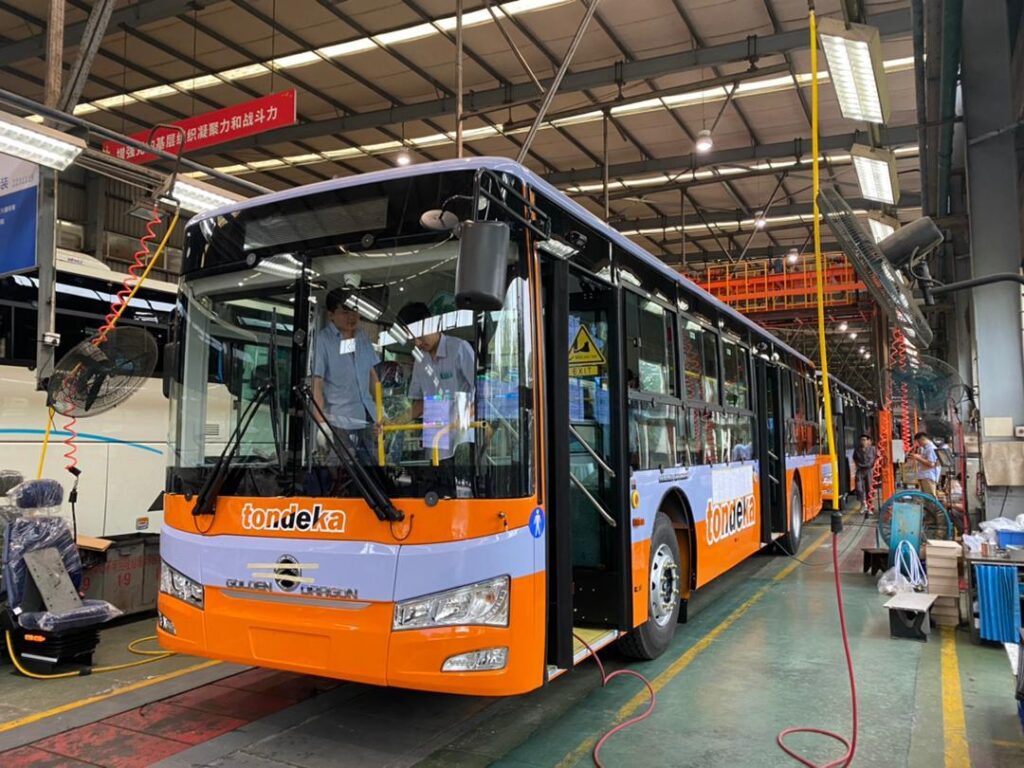Optibus, an Israeli public transportation software provider for mass transit planning, scheduling, and operations currently active in 1000 cities around the world, continues to fuel its global expansion with unique projects that strengthen and diversify the company’s capabilities to optimize the journey for public transportation riders and workers.
First, the mass transport solution has teamed up with Ugandan IT company SCINTL this month to help establish the first public bus network in Kampala, Uganda.
The project, which was arranged by Tondeka Metro Company (TMC). was driven by a presidential initiative to improve public transportation infrastructure in the region and boost economic growth, Optibus said in a statement. It is expected to create more than 12,000 local jobs by 2025. The bus network has support from the World Bank.
@TondekaBTC is in advanced stages of introducing 1,030 buses, 50 of which will be electric, for the Mass Transit Bus System Project in the Greater Kampala Metropolitan Area. #Tondeka #TransportRevolution@KiiraMotors @Tondeka3 @mildredtuhaise @PIMusasizi @allantmuhumuza pic.twitter.com/I2osbY5LeS
— Tondeka Bus Transport Co. Ltd (@TondekaBTC) June 26, 2021
“In Uganda, particularly Kampala, there is no formal, regulated public transportation. Some of the primary modes of travel include individually operated matatus (15-seat mini-buses) and boda bodas (motorbike taxis) that lack standardized fares and schedules. That lack of standardization means riders have no way of knowing where to catch a ride, how long to wait, what the trip duration will be, and what will be the cost,” Optibus CEO and co-founder Amos Haggiag tells NoCamels, “And if people aren’t using informal transportation, they drive, which contributes to congestion and pollution — or they have to walk for miles.”
Founded in 2011, Optibus provides solutions to help mass transportation operators reduce costs and improve passenger service. The cloud-native solution also plans routes, allocates vehicles and drivers, and creates interactive schedules, with an optimization engine powered by AI and algorithms.
Last year, Optibus raised a cool $107 million in a Series C funding round co-led by Bessemer Venture Partners and Insight Partners. The funding brings the company’s total capital raised to $160 million.
With the help of Optibus, the Tondeka Metro Company “will create for Kampala a formal bus network with planned routes and schedules, use our software able to operate the network in real-time so that services are efficient, and manage their deployment of electric buses,” he adds.
Optibus will plan Kampala’s first public bus network from scratch, bringing reliable and secure public transportation to a capital city of 1.5 million people. The bus network will start with 1,030 buses, eventually growing to feature a large fleet of 3,000 buses and will be 100 percent electric bot 2032, Haggiag says.
The technology solution for operating and optimizing the fleet combines Optibus’ software platform with SCINTL’s IT infrastructure. TMC will use Optibus’ software platform to plan all routes and timetables in the bus network from scratch, optimize resource allocation and electric buses, and manage daily operations in real-time.

“TMC is responsible for the deployment, maintenance, and day-to-day operation of the buses, which will be manufactured locally. Optibus provides the end-to-end software infrastructure that TMC will use to make smart, data-driven planning decisions and to coordinate the operation in real-time, including assigning driver shifts, managing EV charging and battery range, and optimizing resource usage,” Haggiag explains.
The project is supported by five government ministries, including Uganda’s Ministry of Science, Technology and Innovation, Ministry of Works and Transport, Ministry of Finance Planning and Economic Development, Ministry of Trade, Ministry of Kampala, and local government authorities. It is expected to significantly decongest Kampala of vehicle traffic, improve air quality, and reduce safety incidents, Optibus said in a statement.
Through TMC’s partnership with Kiira Motors Corporation (KMC) and Rentco Africa, the entire project will be delivered locally, including bus manufacturing.
Sign up for our free weekly newsletter
Subscribe“SCINTL will provide vital local support and the requisite infrastructure, together with Optibus, to provide a one-stop solution that encompasses transport optimization for large transport fleets. This will provide travelers with efficient services and revolutionize fleet management in conjunction with Optibus’ platform,” said Cephas T. Bushuyu, Managing Director for SCINTL.
“This is a great opportunity for Uganda and Africa at large, and a gamechanger in the transportation industry,” said Kevin Short, Head of Technology at TMC.
Haggiag agrees, “In many cities where Optibus is used, our software is a solution for making an existing public transportation system more efficient, sustainable, and equitable,” he tells NoCamels, “In Uganda, we will see just how efficient and sustainable public transportation can be when planned from the start using an end-to-end solution and cutting-edge technology.”
Optibus expands in North America
Transportation agencies and operators in 1000 cities worldwide work with Optibus to increase efficiency and service quality, promote transportation equity, reduce emissions, and modernize their operation.
Optibus is also making a notable expansion in the US by acquiring Portland-based firm Trillium, a software-as-a-service firm that provides real-time transportation data and related services and keeps riders informed of options and changes.
In the deal, Trillium “works with hundreds of US transportation agencies,” Haggiag says. The Trillium team will become Optibus’ fifth US office location and will operate the company’s Global Center for Data Excellence as an Optibus subsidiary — integrating Trillium’s expertise in public transportation data feeds and its team of 25 data experts into the Optibus system, a statement from the company said.

Founded in 2007, Trillium provides General Transit Feed Specification (GTFS) management software and other tools. Its services include what the company called rider-focused websites, service alerts, interactive maps and consulting. The company worked with over 350 transit agencies and operators across the US, including the Port Authority of New York and New Jersey, San Francisco Bay Ferry, Sonoma County Transit, DC Streetcar, and the Departments of Transportation (DoTs) in Massachusetts, Oregon, Colorado, and other US states, to improve passenger experience and communication.
“The acquisition gives Trillium customers access to more services,” Haggiag adds, saying that with Optibus’ expansion into passenger information management systems through Trillium, he believes the company “is now the most comprehensive solution for mass transit operations, both in the United States and worldwide.”

“Our acquisition of Trillium is a major move in that direction. Trillium is a leader in passenger information management systems, helping clients to improve passenger communication and publish real-time service information on transit apps used by billions of people every day,” Haggiag says, “Through Trillium, Optibus has now expanded into passenger information management, making Optibus the most comprehensive solution for mass transit operations.”
Optibus continues to change the game in an industry that is not completely digital just yet and still uses manual methods to make complex decisions about public transportation. Through its Geospatial Suite — launched last year, the company aims to improve transportation by making more transportation networks passenger-friendly through the visualization of crucial geographic information while planning routes, like bike paths on the way to public transit, or towards schools and health clinics.
Haggiag says the company will continue to develop important new capabilities and even release a real-time operations module. “We continue to expand globally into new markets, open new offices, and recruit employees worldwide.”
Related posts

Editors’ & Readers’ Choice: 10 Favorite NoCamels Articles

Forward Facing: What Does The Future Hold For Israeli High-Tech?

Impact Innovation: Israeli Startups That Could Shape Our Future




Facebook comments